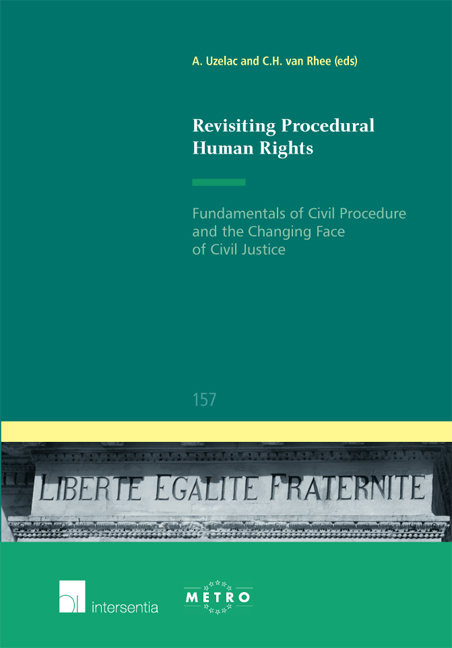 Revisiting Procedural Human Rights
Revisiting Procedural Human Rights from Fundamental Procedural Rights from a National Angle
Published online by Cambridge University Press: 13 October 2018
Introduction
In Roman law, Celsus formulated the famous principle actio nihil aliud est quam ius persequendi iudicio quod sibi debetur. In European states, access to the courts is granted to individual claimants: ‘Access to justice is a fundamental pillar of Western legal culture.’ However, the right of access to the courts is not absolute, but may be subject to limitations; these are permitted by implication since the right of access to the courts ‘by its very nature calls for regulation by the State, regulation which may vary in time and in place according to the needs and resources of the community and of individuals’. In Slovenia, the communis opinio doctorum holds that the most common limitation of access to justice or to the courts is to be found in the form of conditions of admissibility of civil actions.
This contribution begins with an examination of the conditions of admissibility from the point of view of human rights in international and constitutional law. It then describes the role and types of conditions of admissibility in Slovenian civil procedure and gives an overview of the theoretical and judicial application of conditions of admissibility in Slovenia. Next, it presents the division and types of conditions of admissibility. Owing to the international nature of the conference for which this contribution was initially prepared, the contribution concludes with an examination of the conditions of admissibility linked to international law (such as the Slovenian application of the principle par in parem non habet iurisdictionem).
The Slovenian Constitution, Article 6 of the (European) Convention for the Protection of Human Rights and Fundamental Freedoms, and Conditions of Admissibility
According to the Constitutional Court of the Republic of Slovenia:
The right to judicial protection (Article 23 of the Constitution, Article 6 Convention for the Protection of Human Rights and Fundamental Freedoms …) does not mean solely a right to proceedings and to a judicial decision, but also a right to a decision on the merits.
In the same sense, the European Court of Human Rights (ECtHR) ruled that:
[T]he Court reiterates that Article 6 § 1 of the [European] Convention [on Human Rights] guarantees the right of access to a court for the determination of civil disputes.
To save this book to your Kindle, first ensure [email protected] is added to your Approved Personal Document E-mail List under your Personal Document Settings on the Manage Your Content and Devices page of your Amazon account. Then enter the ‘name’ part of your Kindle email address below. Find out more about saving to your Kindle.
Note you can select to save to either the @free.kindle.com or @kindle.com variations. ‘@free.kindle.com’ emails are free but can only be saved to your device when it is connected to wi-fi. ‘@kindle.com’ emails can be delivered even when you are not connected to wi-fi, but note that service fees apply.
Find out more about the Kindle Personal Document Service.
To save content items to your account, please confirm that you agree to abide by our usage policies. If this is the first time you use this feature, you will be asked to authorise Cambridge Core to connect with your account. Find out more about saving content to Dropbox.
To save content items to your account, please confirm that you agree to abide by our usage policies. If this is the first time you use this feature, you will be asked to authorise Cambridge Core to connect with your account. Find out more about saving content to Google Drive.